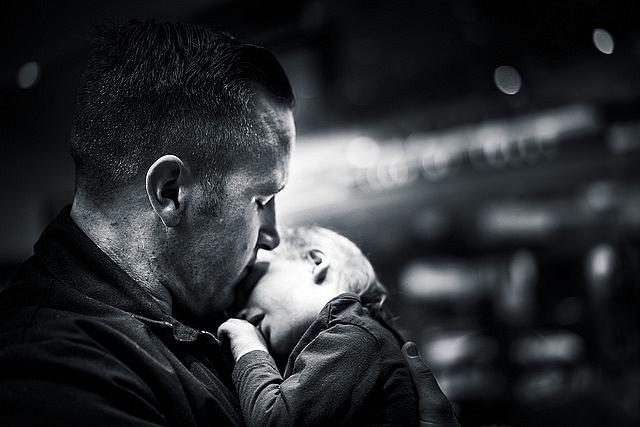We know about maternal depression, but study finds new dads as likely to be depressed
Researchers, legislators and media are paying more attention to maternal mental health in California and across the country. And that attention is slowly turning to fathers’ mental health as well.
“I think people think of postpartum depression as a women’s issue, and not as a family issue,” said Erika Cheng, an epidemiologist at the Indiana University School of Medicine. Cheng is the lead author of a recent study in JAMA Pediatrics that found that new fathers were just as likely to be depressed as new mothers.
Previous research has tended to find lower depression estimates for new fathers compared to mothers. For instance, the Centers for Disease Control and Prevention (CDC) cites a 2010 study that found that about 4 percent of fathers experience depression in the first year after their child’s birth, while a meta-analysis found an average of about 10 percent of new fathers suffered from depression between the first trimester of pregnancy and the child’s first birthday. Between 10 and 20 percent of new mothers experience depression following the births of their babies, depending on the state, according to CDC.
“I think what was different about our study compared to other studies is that, although the rates we found were overall relatively low, they were similar between mothers and fathers,” said Cheng. The study found that about 4.4 percent of fathers were depressed, compared to about 5 percent of new mothers. For the analysis, researchers looked at screenings parents filled out during pediatric visits by with babies 15 months or younger.
The presence — and state of mind — of dads can impact the whole family, beginning in utero. In a previous study, Cheng and her colleagues found higher levels of anxiety, depression, and smoking among pregnant women who reported low partner support. And, in another study, she found that infants without fathers listed on their birth certificate were more at risk for childhood obesity.
“I think what was different about our study compared to other studies is that, although the rates we found were overall relatively low, they were similar between mothers and fathers.” — Erika Cheng, Indiana University
And, as with maternal mood disorders, when new dads experience major depression, they may neglect their kids. Depression in fathers can also negatively affect children’s development and behavior, and can impact the child’s language development.
“The research shows that that involvement and that engagement is really beneficial for fathers, for children, for families,” Cheng said. “We’re challenging the way that we have thought historically about what it means to be a good dad. It’s more than just providing financially for the family. It’s about being there and being involved.”
One small 12-week home visiting pilot program in Los Angeles is trying to help new fathers build stronger bonds with their babies. Partnering with families at the UCLA Maternal Mental Health Partial Hospitalization Program and the Providence Saint John's Child and Family Development Center, the pilot targets new fathers whose partner is being treated for a maternal mood disorder.
“The perinatal mood disorder really affects the whole family, including the dad,” said psychologist Kevin Gruenberg, half of the pilot’s two-man team.
Gruenberg says one of the predictors of a healthy emotional bond between a parent and child is a parent’s ability to make meaning of their child’s behavior. For example, if a child is crying, the parent could notice that the child needs attention, or is hungry, or may be upset that her toy was taken away. So, instead of just reacting to the crying itself, a parent would try to understand the root cause of the crying.
“This is an evolutionary capacity. However, it’s broken down when you’re stressed, when you have a history of trauma,” said Gruenberg, whose pilot is based at the Center for Reflective Communities, a nonprofit focused on building parent-child relationships. “So we believe that helping parents be more reflective, or supporting or growing this capacity, is a way of improving their relationships with their kids. ”
During client visits, Gruenberg might point out certain cues the baby is trying to communicate, or he might help the dad play with his baby, or may even just take a walk around the block with the dad and baby to chat about what’s going on in the dad’s life.
“Our work is really kind of being able to point out, ‘Hey, look how your baby’s responding to you when you do that,’ or ‘ Do you have a sense of what your baby must be feeling when you just did that?’” he said.
Gruenberg will also take video of the father and baby, and will later review the footage with the father, explaining what might be happening inside the baby’s mind and how the baby’s thoughts are driving his or her behavior.
“In all of these situations, we’re really trying to help dad see that infants really thrive when they interact with people who care for them,” said Gruenberg.
“My angle is that men are vulnerable in this time and need support,” he said. “Infants really benefit from being cared for by people who really love them and who understand them and can connect with them, and so that’s been my approach to this work. I really keep the infants in my mind.”
The pilot began in May and will last about a year, reaching eight to 10 fathers.


